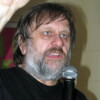Slavoj Zizek

Slavoj Zizek
Slavoj Žižek; born 21 March 1949) is a Slovenian psychoanalytic philosopher, cultural critic, and Hegelian Marxist. He is a senior researcher at the Institute for Sociology and Philosophy at the University of Ljubljana, Global Distinguished Professor of German at New York University, and international director of the Birkbeck Institute for the Humanities of the University of London. His work is located at the intersection of a range of subjects, including continental philosophy, political theory, cultural studies, psychoanalysis, film criticism, and...
ProfessionPhilosopher
Date of Birth21 March 1949
For me, Stalinism was even a greater philosophical problem than Nazism. Under Nazism, if you were a Jew, you were simply killed, no questions asked, you had nothing to prove. Under Stalinism, of course, most [victims] were on trial for false accusations; most of them were not traitors. There is one interesting feature: that they were tortured or through some kind of blackmail forced to confess to being traitors.
Without the communist oppression, I am absolutely sure I would now be a local stupid professor of philosophy in Ljubljana.
This proletarianization of the lower salaried bourgeoisie is accompanied by an excess in the opposite direction: the irrationally high pay of top managers and bankers, a level of remuneration that is economically irrational since, as investigations in the US have demonstrated, it tends to be inversely proportional to the company's success.
I hate writing. I so intensely hate writing -- I cannot tell you how much. The moment I am at the end of one project I have the idea that I didn't really succeed in telling what I wanted to tell, that I need a new project -- it's an absolute nightmare. But my whole economy of writing is in fact based on an obsessional ritual to avoid the actual act of writing.
Are we all not, when we sit in the cinema, in the position of humans in The Matrix, tied to chairs, immersed in the spectacle run by a machine? However, a more appropriate allegory is that of the viewer himself: beneath the illusion that we "just look" at the perceived objects from a safe distance, freely sliding along them, there is the reality of the innumerable ties that bind us to what we perceive.
While just looking, we are always hunting among objects, looking for what we desire or fear, endeavoring to recognize some pattern; on the other hand, objects themselves always "stare back," vie for our attention, throw at us their lures and endeavor to entrap us.
In order effectively to liberate oneself from the grip of existing social reality, one should first renounce the transgressive fantasmatic supplement that attaches us to it.
Postcolonialism is the invention of some rich guys from India who saw that they could make a good career in top Western universities by playing on the guilt of white liberals.
It's bad if we are controlled, but if we're not, it can be even worse.
We Slovenians are even better misers than you Scottish. You know how Scotland began? One of us Slovenians was spending too much money, so we put him on a boat and he landed in Scotland.
What if culture itself is nothing but a halt, a break, a respite, in the pursuit of barbarity?
Obama has already demonstrated an extraordinary ability to change the limits of what one can say publicly. His greatest achievement up to now is that, in his refined non-provocative way, he has introduced into public speech topics which had hitherto been de facto unsayable: the continuing importance of race in politics, the positive role of atheists in public life, the necessity to talk with "enemies" like Iran or Hamas, and so on. This is just what US politics needs today more than anything, if it is to break out of its gridlock: new words which will change the way we think and act.
What is the Absolute? Something that appears to us in fleeting experiences--say, through the gentle smile of a beautiful woman, or even through the warm caring smile of a person who may otherwise seem ugly and rude. In such miraculous but extremely fragile moments, another dimension transpires through our reality. As such, the Absolute is easily corroded;it slips all too easily through our fingers and must be handled as carefully as a butterfly
When authority is backed up by an immediate physical compulsion, what we are dealing with is not authority proper (i.e. symbolic authority), but simply an agency of brute force.